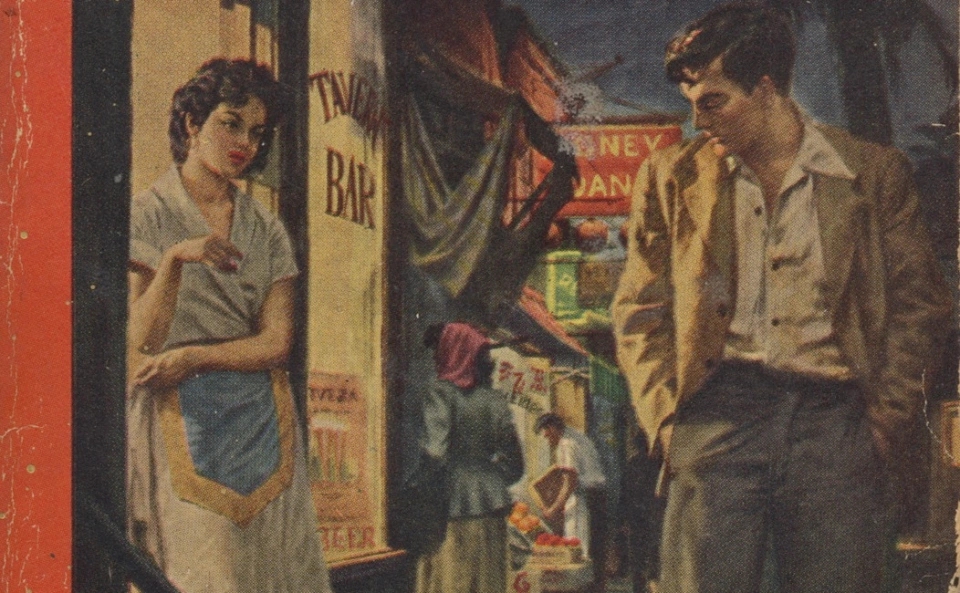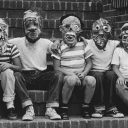
This was young Charles Bukowski’s battle cry, his Tarzan yodel letting all the predators and savages that prowl and skulk through the foliage of the literary jungle, as well as the world at large, that he was a person of note, a force to be reckoned with. By this announcement, he was informing the world that he was a great writer and that he would not stop writing until that fact was officially and universally recognized.
He says he came across Fante’s “Ask the Dust” as a young person at the library he frequented, entirely by accident, and that, upon reading it, he was impressed by the author’s direct and uncomplicated writing style. I’m sure he was also taken by Fante’s combativeness, his anger and ambivalence towards women, and saw in him a sort of kindred spirit. In Fante these traits obviously stem from the fact that, although not unattractive physically, he was a very short man, whereas in Bukowski’s case they more likely come from the unfortunate fact of his own ungainly and unpresupposing appearance. That and his bad relationship with his parents, especially his father. Assuming everything Bukowski tells us about his father is true, he was a very petty man who was obsessed with achieving status in the eyes of society. However, since he is long dead and can’t tell us his side of things I refuse to pass judgement, but the fact Bukowski held him in such contempt certainly explains much of his hostility towards authority, and society in general. Another trait Bukowski and Fante shared, and the one that was very likely the primary reason Bukowski identified so strongly with him, was his absolute obsession with one day being a famous writer. In Fante’s novels his alter ego, the young Arturo Bandini, constantly uses unnecessarily big words to describe simple things to ordinary people. He loves showing off his vocabulary and savors the puzzled reactions he gets by doing so. He obviously has an inferiority complex, not only because of his height, but also because he was the son of Southern European immigrants, and enjoys feeling intellectually superior to the people around him. I believe Bukowski’s ambition was more innocently rooted in the fact that writing was the only thing he felt he was any good at, so he was determined to be judged among the best.
Arturo Bandini was John Fante’s literary stand-in in his four most famous books, all of which I’ve recently read. Obviously, this is what inspired Bukowski to create Henry Chinaski to represent himself in many of his own works.
My own introduction to Fante was, like many people, through “Ask the Dust” because I was reading a lot of Bukowski and Bukowski himself enjoyed sharing what an influence this book had on him. Actually, that book is the third one in the series known as the Arturo Bandini saga, and many people would argue that it’s also the best, and though I agree that it’s pretty good, I personally found the first one, “Wait Until Spring, Bandini”, more enjoyable. In this one he writes about growing up in his Italian family, which I found pretty relatable since I was raised by my grandmother who was a first generation Sicilian immigrant, though my grandmother was much crazier than any of the Italians in his story. The one I liked least was, “The Road to Los Angeles”. It wasn’t even published during his life time and the manuscript was posthumously discovered among his papers, so apparently he didn’t want it published, which I think is a wish posterity should have respected. It’s noticeably more amateurish than his other novels, and the protagonist is embarrassingly obnoxious and insufferable. Being a jerk is obviously a fundamental aspect of Bandini’s character, but here he’s just childishly out of control and I often felt myself cringing uncontrollably as I read his antics.
I was surprised when I read his, “Dreams of Bunker Hill”. He was an old, sick man when he wrote that so I expected the quality of the writing to reflect it, but he seemed to have retained his youthful vigor. Maybe he was animated by the joy he felt by having his work rediscovered after having been forgotten for so many years. I don’t know, but I was surprised he still had so much fire left in him. I guess Fitzgerald’s decline left a rather strong impression on me. His youthful work from the 20s was so alive and imaginative, but when I read his Pat Hobby stories from the early 40s I was disappointed by how comparatively bloodless and plodding the narratives were. But in his case perhaps it wasn’t time, but all his drinking, that took it’s toll.
I also watched the movie, “Wait until Spring Bandini” (which is available free on YouTube), and “Ask the Dust”. Both were actually pretty good and true to the source material. As of this writing those two are the only films made from his series. I’ve not yet read any of his other writings. The rest of his work consists of short stories, as far as I know, so I don’t believe he’s written any poetry, or other full length novels.
Before writing this I briefly checked YouTube to see what other people had to say about Fante’s work, particularly, “Ask the Dust”, and I noticed the videos I watched went on about all the “Racism” in it, which pleased me immensely as “racism” is something that’s not talked about nearly enough in the West these days. (I am, of course, being very sarcastic) No, what I got out these books was a bit different. I was intrigued by their autobiographical aspects and his tireless determination to become a successful writer. As it turned out, despite being published, he never made it terribly big as a novelist, certainly not as big as he wanted. Luckily, despite this, his work for Hollywood writing screen plays afforded him a comfortable life. Bukowski did manage to talk his publisher, Black Sparrow Press, into reissuing his work in the late 70s, but just a few years later Fante would die horribly from diabetes after having had his eyes and legs removed. A pretty sad commentary on the futility of all our earthly ambitions. Bukowski himself miserably died at nearly the same age 11 years later of Leukemia, which is a particularly ghastly form of cancer. I guess it just goes to show that no matter what our ideals or earthly ambitions we’re all still nothing more than corruptible sacks of meat and all due to end our days miserable and suffering alone in pain and fear. I suppose one could make the argument that they live on through their work, but even if this is true I have to seriously wonder how many more years of existence that will buy them, considering the precarious foundations civilization seems to be tottering on these days. No matter how great you are or become you will eventually be buried and forgotten forever under the sands of passing time. All is smoke and vanity.

